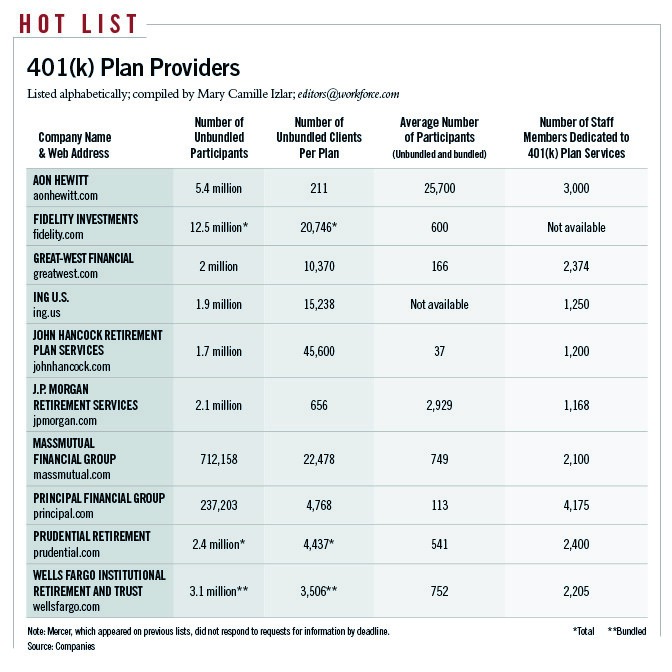The top four trends guiding 401(k) pros
Post on: 25 Май, 2015 No Comment

StaceHilbrant
Stace Hilbrant, recently named Plansponsor’s 2012 Retirement Plan Advisor of the Year, is Managing Director and Founder of Chicago-based 401k Advisors, LLC. Since 2001, Hilbrant and his associates have assisted plan sponsors of 401k plans of all sizes. The firm represents small to mid-sized companies from manufacturers to printing companies and professional sports teams to firms engaged in the automotive and aerospace industries and has over $1.2 billion in assets under management.
Stace’s Latest Posts
I have been in the retirement plan industry for more than 31 years and attend the top industry conferences, seminars and view dozens of webinars every year.
I’ve been fortunate enough to have been invited to speak or to be a presenter or panelist at many industry events over the years. This has afforded my firm, our associates and me the luxury of being able to see what services the very best 401(k) advisers and advisory firms are delivering to their clients right now, as we approach the start of another “plan year.”
Every December, as we end one plan year and approach another, many of the prospective clients, plan sponsors, human resources and finance professionals I speak with ask me, “what are the best, the brightest and the most highly respected advisory firms doing differently this year?”
Having many friendships and relationships with some of this industry’s most highly respected and successful 401(k) advisory firms, I’ll list for you below, (in my opinion), the four most important and effective things that we see the very best advisers doing to help make their clients’ 401(k) plans the best they can be:
Focus on 401(k) participants
Twenty years ago it was common practice for a company to engage one person or firm to act as a stockbroker, life insurance agent, property/casualty/health insurance broker and oversee the company’s 401(k) plan. Today, after “surviving” 408(b)(2), 404(a)(5), the Pension Protection Act and accepting the general acknowledgment that Americans are critically underprepared for retirement, it has become an industry “best practice” to retain a firm or adviser who focuses 100% of his attention on the 401(k) plan and the participants of those plans.
Remember, the preamble to ERISA requires fiduciaries to act “solely in the interest of the plan’s participants and beneficiaries and for the exclusive purpose of providing benefits and defraying reasonable expenses of administering the plan.”
Many plan sponsors are working with advisers to build a “fiduciary brick wall” between 401(k) plan services and other services provided to the firm such as insurance and ancillary financial products. Many see this as a question of potential “conflict of interest.” Many employers are requiring potential advisers sign a “conflict of interest” statement that would potentially disclose any such conflicts.
Rollovers done right
The best firms have found ways to help plan participants become very well educated about the options available at retirement or job change time. Well-informed participants can work with the adviser who assists them in going directly to the providers of rollover products, such as investment and annuity vendors, without an intermediary taking commissions off the top (this can leave more money in the participant’s account).
This “focus” on the 401(k) plan participant has helped weed out brokers who have in the past used their clients’ 401(k) plans to sell high commission rollover annuity products or have encouraged participants to get their assets out of plans after age 59 ½, with earning a higher commission as the broker’s goal.
Don’t misunderstand, there are many instances where participants truly need professional assistance and there are countless industry professionals who earn every dollar they charge the individual clients they work with. The trend is, however, for advisers helping participants learn all they can about their options and assisting the individual in making an informed decision about what they require for future services.
Educate differently
The very best advisers and firms have transitioned away from seeing “education” as simply something that they rely completely on the record-keeping vendor personnel for. Much of this “educational support” has morphed into vendor provided representatives reading through script after script of pre-prepared PowerPoint slides that describe traditional subjects such as style boxes and target date funds.
The very best advisers have learned that the most effective “educational support” is personalized and customized for the target group and teaches subjects such as “how to calculate your progress towards retirement readiness.” It also may include offering participants “investment advice” and personal “one on one” meetings to discuss individual circumstances. This is where advisers and advisory firms earn their fees. Ten years ago, the “best advisers” were those with the thickest and most impressive quarterly report books. Today, the best advisers are those really helping all plan participants prepare themselves and their families for retirement.

A subset of “educating differently” involves advisers who not only help participants better understand their employer’s 401(k) plan and how to use it, but in helping them learn how to become better consumers, better savers and more efficient spenders.
I’ve long been a big fan of encouraging participants to read all they can about financial services and consumer spending issues, such as credit card use and personal credit management. Providing creative and novel ideas about how participants can get out of credit cards debt, reducing non critical spending (such as cable TV and cellphones) can help interested participants free up 401(k) plan savings that they didn’t know existed.
These are a few examples of some things the best advisers are delivering in educational support services.
Vendor reviews every three years
In the past, many traditional “broker” driven relationships between clients and vendors were financially encouraged to retain the same vendor for long periods of time and to rarely challenge what is in place. Today, the best advisers and firms are conducting formal vendor reviews approximately every three years, partially as a fiduciary governance “best practice.”
The data from these vendor reviews becomes part of the client’s fiduciary audit file for long term archival and storage. This data also provides a framework for judging the “reasonableness” of fees being charged, as is required by the Department of Labor and the new fee regulations.
With the past 30 years in this country having witnessed the trend away from tradition defined benefit pension plans and toward virtual full reliance on 401(k) type programs, the role of the 401(k) plan adviser has evolved as well. Some service models that flourished 15 years ago are no longer viable.
Advisors of the future must learn to focus professional time and attention on the plan participant, his family and his future.
The opinions voiced in this material are for general information only and are not intended to provide specific advice or recommendations for any individual. To determine which investment(s) may be appropriate for you, consult your financial adviser prior to investing.
Securities offered through LPL Financial, Member Finra/SIPC. Investment advice offered through Independent Financial Partners, a registered investment adviser and separate entity from LPL Financial.














